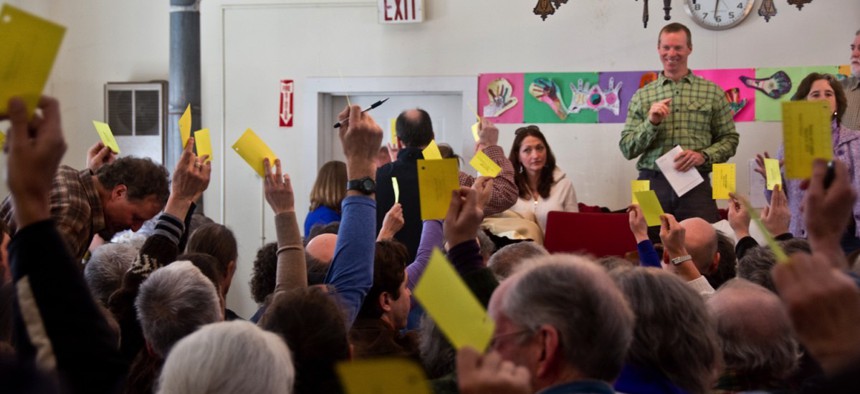States and Cities Are ‘Laboratories’ for Inclusive Governance

Town hall in Vermont Erika Mitchell / Shutterstock.com

Connecting state and local government leaders
Talking Transition NYC is one example of successful cross-sector collaboration promoting civic engagement locally.
Local government presents increased opportunities for engaging citizens to participate in policymaking and strengthening their ability to improve outcomes, according to a new report from the Ash Center at Harvard University's Kennedy School of Government.
Truly inclusive governance requires cross-sector collaboration, writes researcher Hollie Gilman, which has the added benefit of preventing “heightened criticism and an influx of demands” from draining government resources—particularly at the local level.
Coupled with metrics showing officials are regularly consulting residents, public-private partnerships can make local government a force for civic engagement.
Per the paper:
States and cities are in fact the “laboratories of democracy.” The locality is re-emerging as a sphere for inclusive governance. One challenge is ensuring these local initiatives can be greater than the sum of their parts. Inclusive governance is not bound to only urban areas. The local level of government, broadly defined to include rural and exurban areas, provides a more manageable size for citizens to be more closely connected to the policies that impact them the most. Connecting local initiatives to the framework of national and international policy could create significant social value.
Gilman cites Talking Transition NYC as one model of collaborative local civic engagement. Funded by philanthropies like the Open Society Foundations, the drive to inform New York City Mayor Bill de Blasio’s transition into office “created one of the most expansive public opinion surveys in New York history.”
Almost 70,000 people weighed in on city services across social media and in person using tablets and online kiosks and with the help of canvassers speaking 19 languages. The mayor’s office identified eleven opening initiatives as a result of the survey.
While Talking Transition NYC had a strong digital component, it also valued in-person interactions.
“Participation is more than the numbers of “clicks,” “total page views,” or “contacts,” the report reads. “It is also about their nature and quality, including genuine opportunities for deliberation and dialogue.”
You can read the full Ash Center report, part of the Data-Smart City Solutions series, here.
(Photo by Erika J Mitchell / Shutterstock.com)

NEXT STORY: How to spark citizen-driven innovation





